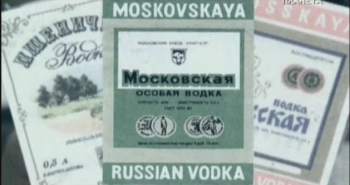

Vodka labels during Prohibition 1985
The main state secret of the Soviet Union is data on alcohol mortality. On the scale were: mortality of the people from alcohol and income from alcoholic beverages. It is no secret that at one time the budget of the USSR, and then Russia, was called the "drunken budget". Here is a small example: during the reign of L. Brezhnev, alcohol sales increased from 100 billion rubles to 170 billion rubles.
According to classified data from the State Statistics Committee of the USSR for 20 years from 1960 to 1980, alcohol mortality in our country increased to 47%, which means that approximately every third man died from vodka. The Soviet leadership was seriously concerned with this problem, but instead of taking measures, it simply classified these statistics. And plans on how to deal with this problem matured very slowly, since the country was moving towards disaster.
Under Brezhnev, vodka prices rose repeatedly, the state budget received additional income, but vodka production did not decrease. The country's alcoholization reached its peak. A crazy crowd of alcoholics composed ditties on unpopular methods of struggle:
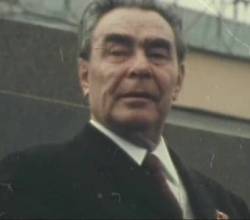
"There were six, and now there are eight,
we still won't stop drinking.
Tell Ilyich, we can handle ten,
if vodka becomes more,
then we will do as in Poland!"
The allusion to the Polish anti-communist events is not accidental. The alcoholic herd was sensitive to the rise in the price of vodka, and was ready to do things like in Poland for the sake of vodka. It got to the point that a bottle of "white" became equal to Soviet currency. For a bottle of vodka, a village tractor driver could plow a whole garden for his grandmother.
Andropov, in the name of Brezhnev and the Politburo, cited objective data that with an average world consumption of 5.5 liters of vodka per capita, in the USSR this figure exceeded 20 liters per capita . And the figure of 25 liters of alcohol per capita is recognized by doctors all over the world as the boundary after which the self-destruction of a nation actually begins .
In the mid-80s, alcoholism in the USSR assumed the scale of a national catastrophe, the people who had lost their minds drowned, froze, burned in their homes, fell from windows. There was not enough space in sobering-up centers, and drug treatment hospitals and treatment and prevention centers were overcrowded.
Andropov received tens of thousands of letters from wives, mothers, sisters, in which they literally begged him to take measures to overcome the scale of drunkenness and alcoholization of society - this was the "groan of the people" from this weapon of genocide. In the letters, grief-stricken mothers wrote how their children, celebrating a birthday in nature, drowned drunk. Or how a son, returning home drunk, got hit by a train. Wives wrote that while drinking, her husband was killed with a knife by drinking buddies, etc., etc. And there were many such letters with similar tragic stories!
A special commission was created in the Politburo to develop a special anti-alcohol decree, but a series of funerals of the country's top officials slowed down its implementation.
 And only in 1985, with the arrival of Gorbachev, the implementation of this decree (Prohibition) began.
And only in 1985, with the arrival of Gorbachev, the implementation of this decree (Prohibition) began.
People continued to drink themselves to death, the decision on radical methods of combating drunkenness was risky, but the calculation was that the USSR would be able to survive the lost income from the sale of vodka, since the price of oil at the beginning of 1985 was about $ 30 per barrel, this was enough to support the Soviet economy. The government has decided to reduce budget revenues from alcohol sales, as drunkenness has reached catastrophic levels. Gorbachev himself is advertising the upcoming campaign, but at his first speeches to the people he speaks in riddles.
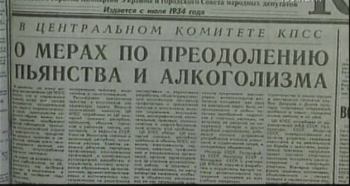 May 17, 1985In all central publications of the country, on television and radio, the Central Committee decree "on measures to overcome drunkenness and alcoholism, eradicate moonshine production" - prohibition - was announced. The majority of Soviet citizens supported the government decree, specialists from the USSR State Statistics Committee calculated that 87% of citizens were in favor of fighting drunkenness, and every third Soviet citizen demanded tougher measures. This data landed on Gorbachev's desk and convinced him that it was necessary to go further. The people demanded the introduction of "prohibition". "Sobriety societies" were created in each team. In the USSR, such societies were organized for the second time, the first time this happened under Stalin.
May 17, 1985In all central publications of the country, on television and radio, the Central Committee decree "on measures to overcome drunkenness and alcoholism, eradicate moonshine production" - prohibition - was announced. The majority of Soviet citizens supported the government decree, specialists from the USSR State Statistics Committee calculated that 87% of citizens were in favor of fighting drunkenness, and every third Soviet citizen demanded tougher measures. This data landed on Gorbachev's desk and convinced him that it was necessary to go further. The people demanded the introduction of "prohibition". "Sobriety societies" were created in each team. In the USSR, such societies were organized for the second time, the first time this happened under Stalin.
M.S. Gorbachev knew about the scale of drunkenness in the country not only from the data that regularly landed on his desk (notes from statisticians, letters from desperate parents, wives, children), but also from Gorbachev's own daughter, who was a doctor and was engaged in research work on alcohol mortality, it was she and her colleagues who collected these materials and showed her father the materials on the colossal mortality in the USSR from alcohol. The data from this dissertation is classified to this day. In addition, Gorbachev's own family was not at all happy with alcohol, Raisa Maksimovna's brother also became addicted to alcohol (from the materials of Raisa Maksimovna's autobiographical book "I Hope").
And then one fine day, 2/3 of the stores selling alcohol closed, and strong drinks disappeared from the shelves. It was then that alcoholics came up with a joke about Gorbachev:
A joke about Gorbachev during the Gorbachev Prohibition:
There is a huge line for alcohol, the alcoholics are indignant.
One, unable to bear it, said: "I'm still going to kill Gorbachev!"
After some time, he comes and says: "the line there is even longer".
The hardened alcoholics did not give in, and began to drink varnishes, polishes, brake fluid, colognes. These dregs of society went further, began to use "BF glue". Hospital admissions with poisoning were not uncommon.
The authorities mobilized scientists and the creative intelligentsia to fight drunkenness. Anti-alcohol brochures began to be published in millions of copies. In the late 80s, a famous doctor and supporter of a sober lifestyle, academician Fyodor Uglov, spoke out in the press. He informed the country about his discovery, the essence of which was that the reason for the physical and moral degradation of the population lies in the use of even small doses of alcohol.
But then another problem arose: speculators began to trade in alcohol! In 1988, shady dealers received 33 billion rubles from the sale of alcohol. And all this money was actively used later during privatization, etc. This is how various speculators made money and continue to make money on the health of citizens!!!
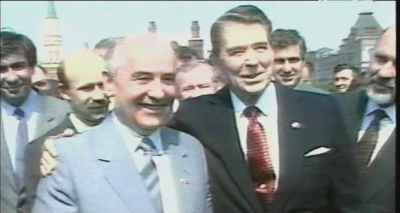 By the way, our overseas friends didn't keep us waiting long! Western analysts were especially interested in the new steps of the Soviet leadership. Western economists put reports on R. Reagan's desk, which say that the USSR, in order to save its citizens, gave up huge incomes from the sale of alcoholic beverages. Military analysts report that the USSR is stuck in Afghanistan, there is an uprising in Poland, Cuba, Angola, Vietnam. And here our "Western friends" decide to stab us in the back!!! The US convinces Saudi Arabia to lower oil prices in exchange for supplies of modern weapons, and in 5 months by the spring of 1986 the price of "black gold" falls from $30 to $12 per barrel. The USSR leadership did not expect such huge losses just a year after the start of the anti-alcohol campaign, and then we began a market bacchanalia! And then in the 90s, so-called experts came to members of the government under the auspices of the Monetary Fund, who said: "You know, the transition to the market is going to be such a hard thing. Millions of people will lose their jobs. God forbid, you start popular unrest. Therefore, we can advise you" - for some reason the Poles especially liked to advise us this (and the US, in turn, told them), - "completely allow alcohol, deregulate, fully liberalize the circulation of alcohol, and at the same time allow pornography. And the youth will be busy. This is what she will be busy with." And the liberals gladly accepted this "advice"; they quickly realized that a sober society would not allow the country to be plundered: it is better for the people to drink than to go out into the streets to demand their rights, to protest against job losses, and wage cuts. And this bacchanaliaI permissiveness led to monstrous alcoholism. That was when the surge in alcoholism began.
By the way, our overseas friends didn't keep us waiting long! Western analysts were especially interested in the new steps of the Soviet leadership. Western economists put reports on R. Reagan's desk, which say that the USSR, in order to save its citizens, gave up huge incomes from the sale of alcoholic beverages. Military analysts report that the USSR is stuck in Afghanistan, there is an uprising in Poland, Cuba, Angola, Vietnam. And here our "Western friends" decide to stab us in the back!!! The US convinces Saudi Arabia to lower oil prices in exchange for supplies of modern weapons, and in 5 months by the spring of 1986 the price of "black gold" falls from $30 to $12 per barrel. The USSR leadership did not expect such huge losses just a year after the start of the anti-alcohol campaign, and then we began a market bacchanalia! And then in the 90s, so-called experts came to members of the government under the auspices of the Monetary Fund, who said: "You know, the transition to the market is going to be such a hard thing. Millions of people will lose their jobs. God forbid, you start popular unrest. Therefore, we can advise you" - for some reason the Poles especially liked to advise us this (and the US, in turn, told them), - "completely allow alcohol, deregulate, fully liberalize the circulation of alcohol, and at the same time allow pornography. And the youth will be busy. This is what she will be busy with." And the liberals gladly accepted this "advice"; they quickly realized that a sober society would not allow the country to be plundered: it is better for the people to drink than to go out into the streets to demand their rights, to protest against job losses, and wage cuts. And this bacchanaliaI permissiveness led to monstrous alcoholism. That was when the surge in alcoholism began.
In the USSR itself, people had no idea what the "Western blow" would turn out to be. In the meantime,
prohibition
was producing results. The sober population immediately began to raise demographic indicators. Mortality in the USSR fell sharply, in the first six months alone, mortality from alcohol poisoning decreased by 56%, mortality among men from accidents and violence by 36%. Many residents during the anti-alcohol campaign began to note that it had become possible to freely walk the streets in the evening.
Women who felt the benefits of prohibition, when they met with Gorbachev, shouted at him: "Don't give in to persuasion to cancel the "prohibition"! At least our husbands saw their children with sober eyes!"
It was during this period that an unprecedented surge in births occurred. Men stopped drinking, and women, feeling confident in the "future", began to give birth. From 1985 to 1986, the country had 1.5 million more children than in previous years. In gratitude to the main reformer, many parents began to name their newborns in his honor. Misha was the most popular name of those years.
In 1988, opponents of Prohibition, mainly members of the government responsible for the state of the economy, reported that budget revenues were decreasing, the "gold reserve" was melting away, the USSR was living in debt, borrowing money from the West. And people like the Chairman of the Council of Ministers of the USSR (1985-1991) N. Ryzhkov began to put pressure on M. Gorbachev, demanding the abolition of the "prohibition". These people have come up with nothing better than to start replenishing the budget by getting their own people drunk.
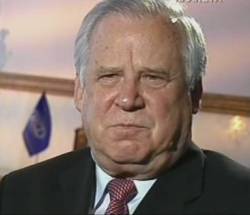
Ryzhkov is an opponent of Gorbachev's dry law